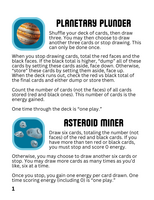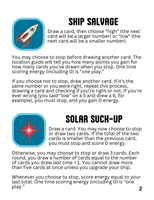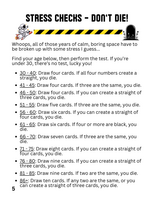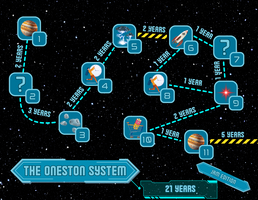Postmortem: 72-hour jam creation




I originally wrote this on our blog (Patreon) and I'm pasting it below :D
The first Ludum Praxi is still running, and I just finished my jam! Ludum Praxi is basically "practice Ludum Dare," so the premise is to make something within a 72-hour period from the time you find out the theme. As I had to announce the theme, I figured I'd randomly select one when I was ready, and my theme was GENERATION SHIP. And what I made after those 72 hours was Their Shadows Awaken!

The Goal
I always tell myself that my goal for Ludum Dare (and Ludum Praxi by extension) is to make something that's:
- Easy to learn. Lots of Ludum Dare games can be played right in the browser in a matter of moments, so reading a lot isn't optimal.
- Requires very few components, all of which are common. Ludum Dare is 99% (or more) digital games, so many gamers don't have fancy dice, lots of cubes, etc. If someone needs something they don't have, they can't play it, meaning fewer ratings and less feedback.
- Requires little (or no) printing. Many video gamers may not even have a printer, and printing can get expensive...
- Is super replayable. My favorite Ludum Dare games are either awesome, complete experiences or make me want to play again. I lean toward replayability as I can't guarantee I'll finish what I intend to make in time to create an "awesome, complete experience."

What is Their Shadows Awaken?
It's a roguelike space game that uses a standard deck of cards! I never thought I'd be able to say that about something I made, and I'm so hyped that I can now.
There are like 8 different types of locations across 9 Star Charts (maps). Only one of those is made so far —the tutorial galaxy— but still!
In Their Shadows Awaken, you're one of 100 engineers aboard a ship that takes 500 years from the beginning to the end of its journey. You wake up from cryosleep a little over halfway into the journey to take over engineering duties (only one of you is awake at any given time, and when one dies, another is awoken). With over 200 years left, there's no chance you'll survive the trip...
Until one day you realize that if you use the transporter over and over at super-fast speeds, you can de-age something! It takes a MASSIVE amount of energy to de-age a banana a day, but you prove it can be done. So your goal is to amass energy along the journey to de-age yourself, improve the ship, and survive the trip home.
There are four minigames involved, each of which uses the deck of cards (which is just the four suits in A-6 to begin with, but you get more cards throughout the game). There are random events, shops, and all sorts of other things along the way too!

How Does That Compare to the Goal?
Well... pretty well, I think!
- It's easy to learn, although there are two documents to flip through as you play. I made this as simple as possible by putting the rules to the minigames in a small booklet along with reminders of what all of the icons mean, and even fit some game tips in there!
- All you need is a deck of cards and a token of some sort for your ship, along with one print. Or you can play using like Paint or something! Oh, and paper and something to write with to track your age, energy, etc. Later there'll be two more sheets to print: Engineering (for ship upgrades and de-aging) which is reusable and a Personnel File for tracking your engineers (not reusable). That's still pretty fair.
- The minigames are short and super replayable! And because they're interspersed by one another and other activities, I don't think they get annoying or anything. Plus, once the whole game is done, the entire thing should be replayable with different challenges, envelopes to open, relics to discover, etc.
Lessons Learned
As always, I picked up some vital lessons from this jam...
Push Through Anxiety
Anytime a game requires balancing, I get anxious. Anyone can write journaling prompts, although I'll definitely say that games with GOOD journaling prompts are not easy. But if I sit and make a game that's solely journaling, I don't even NEED to playtest it because it won't be broken. Playtesting helps a lot, don't get me wrong, but if I finally slap it together 5 minutes before the deadline it'll be okay.
With a game with balancing, with mechanics, you need to playtest it a lot. And at first, it's awful. I mean, unless you're some god-like designer, every design is trash at first. "I don't even know why I do this, I'm so bad at it" trash. But if you keep going, you can push through that and turn it into something that's okay, and then good, and then something you truly enjoy regardless of who made it. But it takes a BIG push to get through that.
Ludum Dare/Praxi force me to push through that, because if I give up every time there's anxiety, then I have nothing at the end. And the anxiety of presenting nothing is far greater than the anxiety of "I suck lol."

PLAYTEST EARLY!
This was easily the biggest lesson, though. I actually wrote a document out and did quite a bit thinking the game would be fun and then... it wasn't. And I couldn't make it fun.
I started with the core game: flip cards, then perhaps flip more, maybe repeating that once more. If the red cards total up to more than the black ones, you save them. If not, you discard them. I was using the whole deck and it just wasn't interesting. It was okay...
Then I got rid of the J/Q/K cards, and it was better, but still super dull. Who wants to play that for an hour or more?
I tried to play with the cards and see what I could do with them that would be fun. I came up with a few little games, but none were great. They were all super meh actually...
I wanted to cut the deck down so you could earn the other cards later, and I chose starting with A-6 because that's 24 cards, which is evenly divisible by 3. The core game became "flip 3 cards, then either flip 3 more or don't," so there would never be any leftover cards... until you add more to your deck, at least. This was SO MUCH BETTER!
I also found that I liked the simplicity of this singular choice more: draw again or don't. It had more depth than I realized: if the black cards way outnumbered the reds, I'd dump them. If the reds barely beat the blacks, I'd save them. But if the blacks were barely above the reds, or if the reds were WAY above the blacks, I'd draw again in hopes of reclaiming the blacks or overcoming big black cards with the surplus of reds I already had. And the limited deck meant that each draw mattered. Yet there were still loads of times when I felt "safe" and failed; I always felt at least a little reluctant when I pushed my luck. That was PERFECT.
I eventually changed the energy-scoring system, too. Originally you totaled the reds and subtracted the blacks. So if you had like 6 red and 5 black cards, and the reds totaled 25 and the blacks 21, you earned 4 energy. The idea was the black stuff was garbage that needed to be incinerated, and the red could be converted to energy. But that defeated the purpose of that BARELY beating the black total, so I changed it to where each card equals one energy. Even the black cards! This also killed a lot of the math, meant less sorting red and black cards (or cards of the same number) together and thus making shuffling less reliable, and gave moments that were exciting! Beating a 15 black total with 16 red was now a win, and far more under your control.
Plus, while I always describe my games theme/concept first, I have FUN with the mechanics. And that's what pushes me to work on a game, as playing a game that's not fun over and over is a huge chore even with an amazing theme...

Check out SRDs LATER Rather than Right Away
I usually start a Ludum Dare by checking out ideas I already have (I forgot to do this lol) and then, if I have none, looking into SRDs (System Reference Documents, systems that you can use to make your own games). I spent a good hour or two looking at SRDs and found only one that might fit: Powered by Sentinel. It became my backup. I've always wanted to use that system anyway, and having multiple engineers who protected the ship over hundreds of years made perfect sense for the system. But the time I took to research a lot of things that just didn't work, especially at night before going to bed, ruined a whole night of thinking about things to do on my own.
See, normally Ludum Dare starts at like 6 or 7 pm my time (Eastern). This gives me lots of time at night to think about an idea, pick one, and then toss that idea around in my head as I sleep. I normally wake up with some things to try out. But I started this jam at 10 pm, and then did that research. That totally killed my momentum...
Things That Went Well
With all of that said, some things did go well, and I'm super proud of what I made.
Roguelike! OMG!
Early in the design of this, I had ideas for myself.
 ^ I brainstorm and live-chat my ideas on our Discord server in forum-like channels.
^ I brainstorm and live-chat my ideas on our Discord server in forum-like channels.
Looking over it again, all I really knew was that I wanted it to be a roguelike with a deck of cards. The rest all changed 😅 But that limitation was exciting and I loved that I stuck with it.
And I think once the game is done and balanced, I'll be even more proud of it being a roguelike as it is. Even if it's far more Slay the Spire than Rogue Legacy.
I have several other roguelike ideas, and now I feel more confident in chasing them!
I Finished the Docs Early on Day 3!
Normally at the end of Ludum Dare I'm quickly throwing rules and stuff together. But I had the rules done on day 2, and early day 3 I had the reminder booklet done too! In fact, day 3 was basically just "write out the 40 random events and edit." Which is good because my head was NOT in it this time around. I think I knew it was a practice jam because I think I gave it about 70%.
Having all of the docs done on day 2 meant I was already happy with that stuff, and day 3 was more just designing than slapping the remaining pages together. Which is great because this game has three docs: the Star Chart image PDF, the Rulebook/Guide (a 13-page full-page PDF), and a Game Almanac and Reminder Booklet (8 pages in 4-page zine format). That was a lot lol.
The Development of the Games Went Fairly Well
I'm learning to embrace my shotgun-designing nature. Some people find one amazing thing and polish the heck out of it, making it more elaborate and awesome. I find a bunch of stuff I like and combine it all lol. The last Ludum Dare was a collection of 13 dice games, and this is a collection of 4 card games plus other stuff.
I find that I'm enjoying the process of just taking some components and playing with them until I figure out a way to make it fun. With Crawling to the Brink, I literally played around with cubes or meeples on playing cards, and rolled dice. With this, I just messed with simple things you can do with cards solo. And I think the four little games work well together, even thematically to a degree, with your minimal deck.
Plus, I plan to alter the rules of the game as you go along. Like rather than just drawing 3 cards, maybe one planet has soft soil so you draw 4 at a time. Maybe a ship will make you draw 2 cards for high/low instead of one. Maybe a sun will make you play in reverse, aiming for smaller and smaller numbers with fewer cards. There's no limit to alterations! Heck, maybe I'll come up with some more little games between now and then too.

Worldbuilding and Tying the Game in With Existing Games
As I was making this, I thought it'd be interesting if it was a prequel to Their Shadows Slumber. I still need to tie that in better, but it fits: you're traveling through space, converting random stuff you find into energy. In Their Shadows Slumber, you're crashed on a planet and need to convert random stuff into energy to escape.
I felt like the fact that you're collecting these things would lead to you saving some. You'd literally draw them into a room where you preserve them. And then when you make it to Asterion (the end of the game), they're inspired by the fact that you preserved and discovered these things and create an official team to do more of it in the future. And that's the premise of Their Shadows Slumber: you're one of those teams that preserves items when you hit an asteroid and crash.
I'm also proud of the worldbuilding I did along the way. The ship has anti-hitchhiking code in it, so you can't stop anywhere that life exists. Therefore, the shops are droid ships: Interstellar Inventory. One of the random events has you surrounded by these ships, now sentient, protesting being unpaid. You can join in (you make very little money and are likely to die doing the job, it makes sense to protest) or skip it. Even skipping it makes them pity you, pity the universe, because you're so poor and devoid of hope that you can't even afford to protest.
Then there's the whole story of the ship, the mocking of the TItanic (your ship is the Mammoth), and I plan to use the naming system from Earthbound with the galaxies. Your first galaxy is The Oneston System, and then the second is The Twonderful Territories. In Earthbound, the names of the towns started with their numbers: Onett, Twoson, Threed, etc. I loved that game and I want to honor it this way :D

That's a Wrap!
It'll be a while before I get back to this game. We're in July, the middle of Mini Zine July 2024, which means making 7 zines each! Plus, we have a bunch of other incomplete games I want to get to, several of which will take priority.
If you're interested in this game, let me know! Knowing how interested people are in our incomplete games goes a long way toward helping us know what to work on next :D
What's a random event you'd want to see in space? It can be silly, serious, scary, ridiculous, whatever 🙌
Files
Get Their Shadows Awaken
Their Shadows Awaken
A roguelike space game using a standard deck of cards
| Status | Prototype |
| Category | Physical game |
| Author | Beth and Angel Make Games |
| Genre | Card Game |
| Tags | Roguelike, Roguelite, Solo RPG, Space, Tabletop |
Leave a comment
Log in with itch.io to leave a comment.